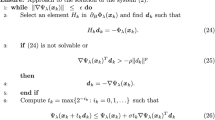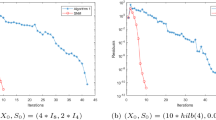Abstract
In this paper, based on the implicit fixed-point equation of the linear complementarity problem (LCP), a generalized Newton method is presented to solve the non-Hermitian positive definite linear complementarity problem. Some convergence properties of the proposed generalized Newton method are discussed. Numerical experiments are presented to illustrate the efficiency of the proposed method.
Similar content being viewed by others
References
Cottle, R.W., Dantzig, G.B.: Complementary pivot theory of mathematical programming. Linear Algebra Appl. 1, 103–125 (1968)
Cottle, R.W., Pang, J.-S., Stone, R.E.: The Linear Complementarity Problem. Academic, San Diego (1992)
Murty, K.G.: Linear Complementarity, Linear and Nonlinear Programming. Heldermann, Berlin (1988)
Schäfer, U.: A linear complementarity problem with a P-matrix. SIAM Rev. 46, 189–201 (2004)
Cryer, C.W.: The solution of a quadratic programming using systematic overrelaxation. SIAM J. Control. 9, 385–392 (1971)
Ahn, B.H.: Solutions of nonsymmetric linear complementarity problems by iterative methods. J. Optim. Theory Appl. 33, 175–185 (1981)
Mangasarian, O.L.: Solutions of symmetric linear complementarity problems by iterative methods. J. Optim. Theory Appl. 22, 465–485 (1977)
Pang, J.-S.: Necessary and sufficient conditions for the convergence of iterative methods for the linear complementarity problem. J. Optim. Theory Appl. 42, 1–17 (1984)
Tseng, P.: On linear convergence of iterative methods for the variational inequality problem. J. Comput. Appl. Math. 60, 237–252 (1995)
Van Bokhoven, W.: Piecewise-linear Modelling and Analysis. Proefschrift, Eindhoven (1981)
Dong, J.-L., Jiang, M.-Q.: A modified modulus method for symmetric positive-definite linear complementarity problems. Numer. Linear Algebra Appl. 16, 129–143 (2009)
Bai, Z.-Z.: Modulus-based matrix splitting iteration methods for linear complementarity problems. Numer. Linear Algebra Appl. 17, 917–933 (2010)
Hadjidimos, A., Tzoumas, M.: Nonstationary extrapolated modulus algorithms for the solution of the linear complementarity problem. Linear Algebra Appl. 431, 197–210 (2009)
Ortega, J.M., Rheinboldt, W.C.: Iterative solution of nonlinear equations in several variables. Academic Press, USA (1970)
Benzi, M.: A generalization of the Hermitian and skew-Hermitian splitting iteration. SIAM J. Matrix Anal. Appl. 31, 360–374 (2009)
Li, W.: A general modulus-based matrix splitting method for linear complementarity problems of \(H\)-matrices. Appl. Math. Lett. 26, 1159–1164 (2013)
Xu, W.-W., Liu, H.: A modified general modulus-based matrix splitting method for linear complementarity problems of \(H\)-matrices. Linear Algebra Appl. 458, 626–637 (2014)
Hadjidimos, A., Lapidakis, M., Tzoumas, M.: On iterative solution for linear complementarity problem with an \(H\)-matrix. SIAM J. Matrix Anal. Appl. 33, 97–110 (2012)
Zhang, L.-L.: Two-step modulus-based matrix splitting iteration method for linear complementarity problems. Numer. Algor. 57, 83–99 (2011)
Zhang, L.-L., Ren, Z.-R.: Improved convergence theorems of modulus-based matrix splitting iteration methods for linear complementarity problems. Appl. Math. Lett. 26, 638–642 (2013)
Zheng, N., Yin, J.-F.: Accelerated modulus-based matrix splitting iteration methods for linear complementarity problems. Numer. Algor. 64, 245–262 (2013)
Zheng, N., Yin, J.-F.: Convergence of accelerated modulus-based matrix splitting iteration methods for linear complementarity problem with an \(H_{+}\)-matrix. J. Comp. Appl. Math. 260, 281–293 (2014)
Ahn, B.H.: Iterative methods for linear complementarity problems with upper-bounds on primary variables. Math. Program. 26, 295–315 (1983)
Author information
Authors and Affiliations
Corresponding author
Additional information
This research was supported by NSFC (No.11301009) and by Natural Science Foundations of Henan Province (No.15A110007).
Rights and permissions
About this article
Cite this article
Wu, SL., Li, CX. A generalized Newton method for non-Hermitian positive definite linear complementarity problem. Calcolo 54, 43–56 (2017). https://doi.org/10.1007/s10092-016-0175-2
Received:
Accepted:
Published:
Issue Date:
DOI: https://doi.org/10.1007/s10092-016-0175-2




